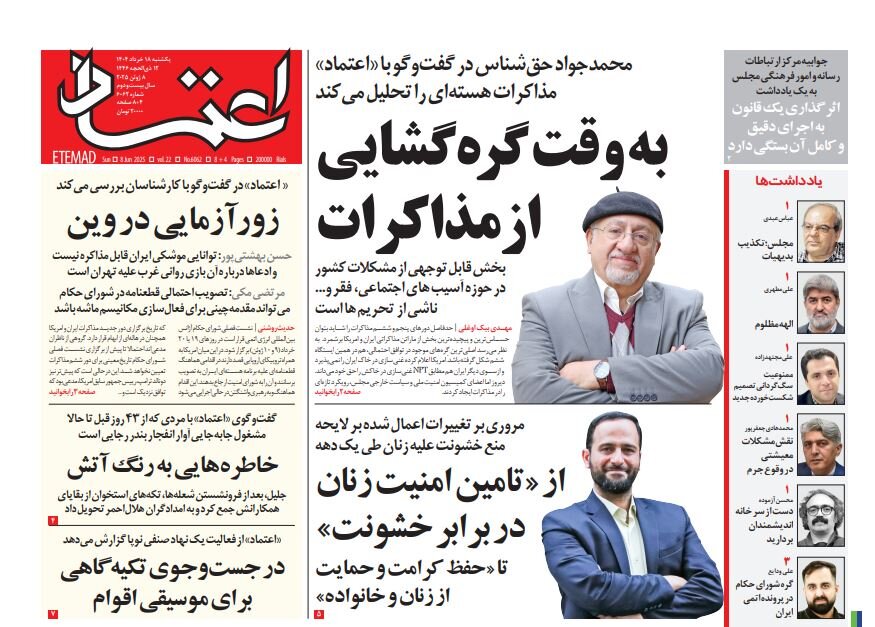TEHRAN – In an interview with Aborgassem Delphi, former Iranian ambassador to Paris, Etemad examined the disruptive and coordinated actions between Washington and the European troika and approved an anti-Iranian resolution before the Judiciary Committee of the IAEA Committee.
He said: During the last five rounds of negotiations, some specific features have emerged. The first point relates to the composition of the negotiating actor. The Trump administration tends to consult with Iranian representatives only and exclude other actors, especially Europeans. This is while Europe has the tools at its disposal that can be used to use in the negotiation process. Washington does not want Europe to enter into new negotiations directly. The goal for Americans is to use all available tools, including European leverage, to put pressure on Iran and get concessions at the negotiation table. The key point is that Europe should not be considered an absolute enemy. Europe is the only party that can activate the snapback mechanism against Iran in the current situation. Therefore, a tense conflict with this group of actors is not of our concern. If regional capacity, economic relations, and diplomacy are used effectively, they can have a negotiation advantage.
Iran: Depth of Iran’s intelligence report penetration within Israel
In the commentary, Iranian newspapers discussed the fierce intelligence blow of the Islamic Republic to the security services of the Zionist regime. Written: In the course of years of conflict between Tehran and Tel Aviv, this issue is now related to conflicts in the intelligence reporting field. The think tanks and analytics labs of Israeli security agencies are now warnings again for every new spy incident. Like in the past year, Israel’s intelligence agency has been forced to acknowledge the bitter reality. In other words, in just 12 months, at least 20 Iran-related spy cases have been filed within the occupying territories. At first glance, the case collection appears to have a different face to the analysis of Israeli security agencies, as despite differences in detail, the perpetrators, recruitment plans, and even the target society of Iranian intelligence reporting agencies adopts a systematic form that is repetitive. The administration’s internal security services (Shin BET) have reported a continuing increase in such cases. But trying to make the media and official authorities look small and insignificant is a more worrying issue for Israeli security experts.
Arman-E-Emrooz: A major transformation in West Asia
In the analysis, Ahman et Emruz discussed a major shift in Riyadh’s policy, writing: The restored relationship between Iran and Saudi Arabia has changed regional dynamics. Riyadh has expressed his willingness to promote a new nuclear agreement between Iran and the United States, with a complete shift from its previous position. Israel’s attacks on Hamas and Hezbollah and the collapse of Syrian Bashar al-Assad’s government were also influential factors. By establishing ties with Tehran, Saudi Arabia has become a less risky option for itself. The next factor is the emergence of Israel as a potential hegemony in the region. Israeli military operations have put Saudi leaders on alert. Saudi Arabian leaders now view Iran as a balancing factor. With this new strategic calculation, Riyadh quietly opposed military attacks on Iran. This is opposed to military attacks on Iran from a Saudi Arabian perspective, as it is a necessary factor to maintain a multipolar balance in the Middle East.
Ettelaat: Will the possibility of an Iran-US agreement collapse in the future?
Despite the resumption of negotiations between Iran and the United States, the crisis of trust between the two countries remains one of the central challenges to Iran’s foreign policy. Experiences of the collapse of the JCPOA and inability to offset the effects of European sanctions have made Iran skeptical of compliance with Western international obligations. This mutual distrust makes negotiations largely tactical, temporary and vulnerable, and prevents the formation of a stable framework for long-term cooperation. In these circumstances, even if a new agreement is reached, there is a high possibility of collapse due to government changes and unpredictable developments. Pressure from Washington’s regional lobbies, such as Israel and some Arab countries, and the role of Congress in blocking the path to lifting sanctions, has made it even more difficult to reach a durable and reliable agreement. Thus, the crisis of trust with the West is not only a technical obstacle to negotiations, but also a strategic challenge for the future of Iran’s diplomacy, and can balance two strategies: “maximum resistance and conditional negotiations.”

